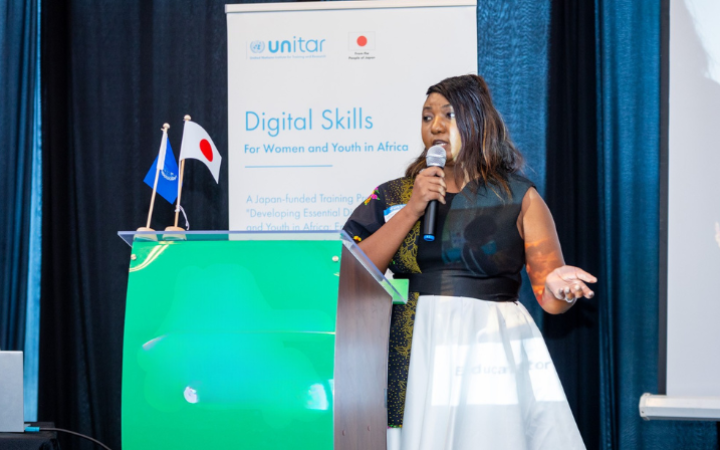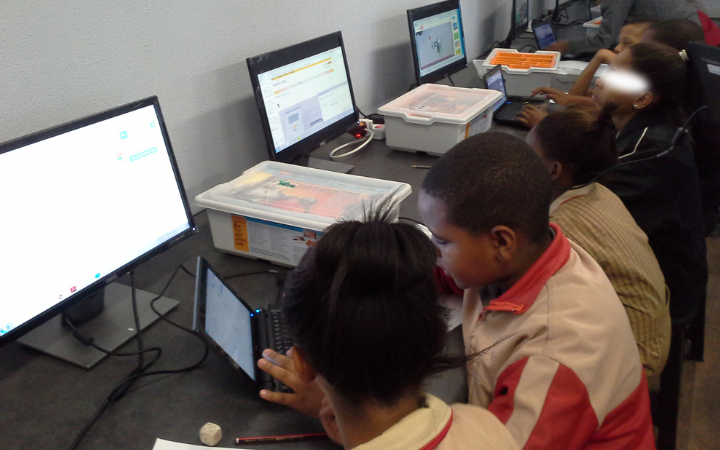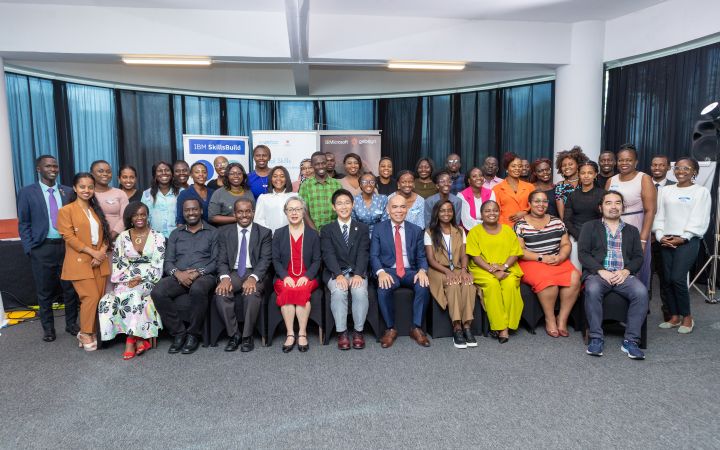- Lucretia Dreyer, a South African disability inclusion advocate, completed the 2023 UNITAR "Developing Essential Digital Skills for Women and Youth in Africa: Enhancing Employment Opportunities and Livelihood Development in the Digital Economy" training programme.
- The programme showed Lucretia the significant potential of assistive technologies in helping children with disabilities learn coding and robotics.
- Lucretia hopes to establish an inclusive coding and robotics programme where children with and without disabilities can learn together.
- The Japan-funded UNITAR programme ran from November 2023 to March 2024 and aimed to prepare 7,000 women and youth from 24 Anglophone African countries with digital skills to thrive in a digital-driven world.
22 January 2025, Hiroshima, Japan - Lucretia Dreyer is an advocate for disability inclusion in South Africa. Driven to empower youth and bridge the digital divide, Lucretia is exploring how artificial intelligence (AI) and assistive technologies can enhance the learning experience for children with disabilities in STEM.
A Turning Point: Including Children with Disabilities
Growing up in a small South African village, Lucretia watched her mother, a school administrator, use an old-fashioned typewriter for administrative tasks. The technology sparked Lucretia's curiosity. She was fascinated by the mechanics of the typewriter and tried to understand how it worked, often attempting to fix issues.
Despite her interest in technology, societal expectations for girls at the time discouraged her from pursuing the STEM fields. "You get told that tech is for boys, math is for boys, and you get diminished," Lucretia recalls. Steered by such societal pressures, coupled with limited access to quality education and resources, Lucretia pursued a degree in physiology.
Yet, Lucretia's inherent passion for technology lived on. A turning point arrived when she volunteered for a coding and robotics programme in 2012. Initially, she wanted to "just teach 1 million African children" so they could see abstract math and science come alive and become interested in the exciting world of STEM. However, she soon realized a critical gap: the exclusion of children with disabilities.
"I realized that there is a huge group of children that I have actively excluded and marginalized. These are children with physical impairments, children who cannot see, who can build robots if we introduce some assistive technologies. And that's opened up a whole new world," she explains. This realization ignited a new passion to advocate for inclusive and accessible STEM education for all children.
The UNITAR Programme: A Catalyst for Change
Recognizing the need to enhance her technological skills and knowledge, Lucretia sought opportunities for professional development. This led her to the UNITAR Developing Essential Digital Skills for Women and Youth in Africa programme. The programme, which ran from November 2023 to March 2024, aimed to enhance the employability and competitiveness of 7,000 African women and youth in the global workforce, readying them with the "4th Industrial Revolution" and future-of-work digital skills in a digital-driven world. The programme, funded by the Government and People of Japan, focused on 24 Anglophone African countries.
The UNITAR programme proved to be transformative. The first phase, an online training, provided Lucretia with a solid foundation in AI fundamentals. "When we say AI, we tend to think of robots that do something. But I learned about emerging technologies such as computer vision, neural networks, deep neural networks, and machine learning. And I realized that we could use computer vision and smart glasses to teach learners with visual impairments subjects such as math, coding and robotics", she explained.
I learned about emerging technologies such as computer vision, neural networks, deep neural networks, and machine learning. And I realized that we could use computer vision and smart glasses to teach learners with visual impairments." -Lucretia Dreyer, UNITAR alumna, South Africa
Lucretia developed the idea as her self-led project in the second phase of the programme, while also learning how to use design thinking and incorporating strategy and process into her planning. She was also one of 25 top participants who were chosen to join the in-person workshop in Phase 3, which was held in Nairobi.
"Travelling and seeing a new country, meeting up with new people - it was more impactful than [the organizers] could ever imagine," Lucretia notes . The workshop not only gave her insights into sustainability and community leadership but also let her foster valuable connections with participants from diverse backgrounds.
Opening Possibilities for Women in Tech
Lucretia's appreciated the UNITAR programme's support to women - including women older than 35 - in navigating a fast-paced, male-dominated field. In particular, the exposure to a diverse network of women from countries around Africa, as well as from Japan and other parts of the world, broadened her perspective and highlighted the evolving opportunities for women in tech. To women seeking to advance their careers in the tech field, Lucretia underscores the importance of continuous learning and embracing new opportunities.
[The UNITAR programme] was truly life-changing, especially for a woman in her 40s . It changed [my] whole outlook on life. And I will forever be grateful." -Lucretia Dreyer, UNITAR alumna, South Africa
Building A More Inclusive Future
Empowered by her newfound knowledge and experience, Lucretia is pursuing her vision of creating a more inclusive and equitable future for all children. She is studying towards a master's degree in disability studies and completing a 12-month data science and machine learning programme. Using her accumulated knowledge, skills and experience, Lucretia hopes to start an inclusive and free after-school or weekend coding and robotics programme for children, where children with disabilities learn side by side with non-disabled children. She also hopes to train unemployed youth with disabilities and hire them as workshop facilitators.
United Nations Online Volunteer Reggy Nur Muhammad contributed to this article.









